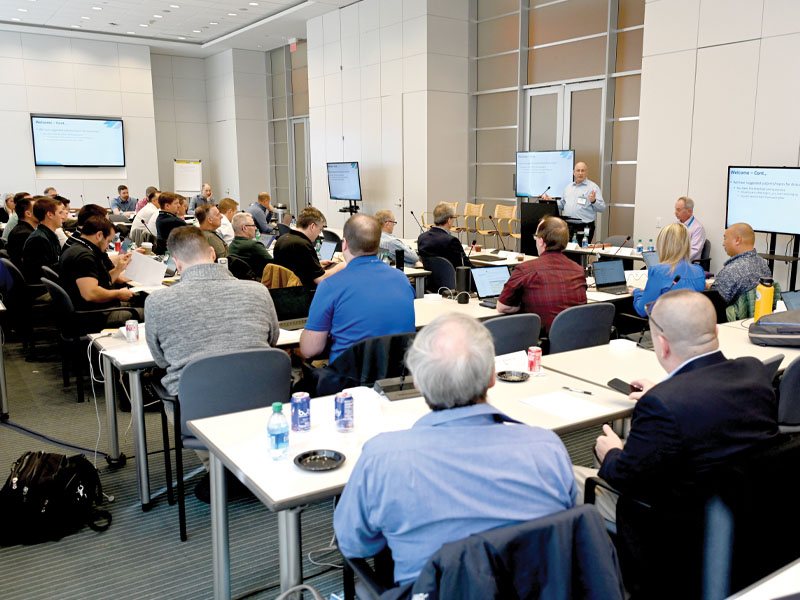Scheduling Workshop Focuses on Pairing/Rotation Construction
By Kevin Cuddihy, Contributing Writer

Jeff Nooger, a senior scheduling and work-rule analyst in ALPA’s Economic & Financial Analysis Department, standing, welcomes attendees to the Pairing/Rotation Construction Scheduling Workshop held at the Association’s McLean, Va., offices.
Whether called pairings, rotations, blocks, or another term, scheduling directly impacts a pilot’s quality of life. And few subjects are as detailed and intricate as the science of creating schedules.
To address this important topic, ALPA held the Pairing/Rotation Construction Scheduling Workshop on March 19–21 at the Association’s McLean, Va., offices. Moderated by Jeff Nooger, a senior scheduling and work-rule analyst in ALPA’s Economic & Financial Analysis (E&FA) Department, and Cory Tennen, E&FA’s lead scheduling and work-rule analyst, the workshop was the second in a series of scheduling meetings, with the first, the Preferential Bidding System Workshop, taking place last October.
More than 50 pilots from 22 ALPA pilot groups along with representatives from the Teamsters, the Southwest Airlines Pilots Association, and the Independent Pilots Association convened to share best practices and discuss the scheduling pairing construction process from the pilot perspective, such as interacting with the company, technical issues, best practices, costing, potential contractual language to gain or increase input, and fatigue.
Attendees included those from large mainline carriers; small and fee-for-departure carriers; cargo-only, passenger-only, and mixed-flying carriers; U.S. and Canadian pilot groups; and those involved in scheduling and those wanting to learn more about the process.
“This workshop will get deeper into the scheduling topics you’re all facing,” remarked Nooger when welcoming the pilots. He encouraged attendees to network with their peers, saying, “Interact with each other, learn from each other, and take things back that can help your pilot group achieve your goals.”
Nooger and Tennen presented the pilots with an agenda that facilitated open conversations, adding topics as they arose. Throughout the workshop, pilots provided demonstrations of their scheduling processes and practices, which showcased a variety of approaches and highlighted the various needs of the pilot groups.
The workshop began with a discussion of each pilot group’s current involvement in the scheduling process, which included those that have full access to scheduling software and can create their own pairing sets, those that review and suggest pairing improvements, and those that have little or no access and are seeking to gain more input.
A lengthy panel discussion centered on the need for balance when providing input to management, an ongoing theme. Generally speaking, the company focuses on cost while the pilot group puts a higher priority on quality of life and safety. “We want to increase the quality of life for our pilots as much as possible with our review,” said Capt. Jeff Chang (Delta), one of the panelists.
By keeping the company in mind, the pilot group earns credibility that can increase future input. “When you have that credibility,” explained Capt. Jon Ingalls (Sun Country), “if something comes up where you say, ‘we can’t do that,’ the company is more likely to listen and fix it.”
“I generally suggest that you try to get as much input and contractual language as possible,” remarked Tennen, “but I also suggest you leave the final responsibility and approval of your pairing sets with management in order to protect your overall contractual rights.”
Nooger and Tennen led a discussion on the various software programs used by pilot groups, allowing attendees to converse with their counterparts who use the same software. Various pilot committees also shared ways that they use add-on or internally created applications to help them review pairings to improve schedules and conduct costings by taking into consideration things such as trip mix, base balancing, commuters, fatigue, and more.
While many pilot groups have noncontractual processes with management regarding their input on scheduling, attendees shared contractual language they’ve gained to codify the process. The group discussed methods for prioritizing this language in negotiations, including having a member of the Scheduling Committee in the room when the section of the contract is being discussed.
At the end of the workshop, pilots left with a wealth of advice and knowledge to address their own situations, as well as the contact information of 50-plus colleagues they can reach out to when new concerns arise.
The Scheduling Workshop series continues in October with a focus on day-of-operations issues.

